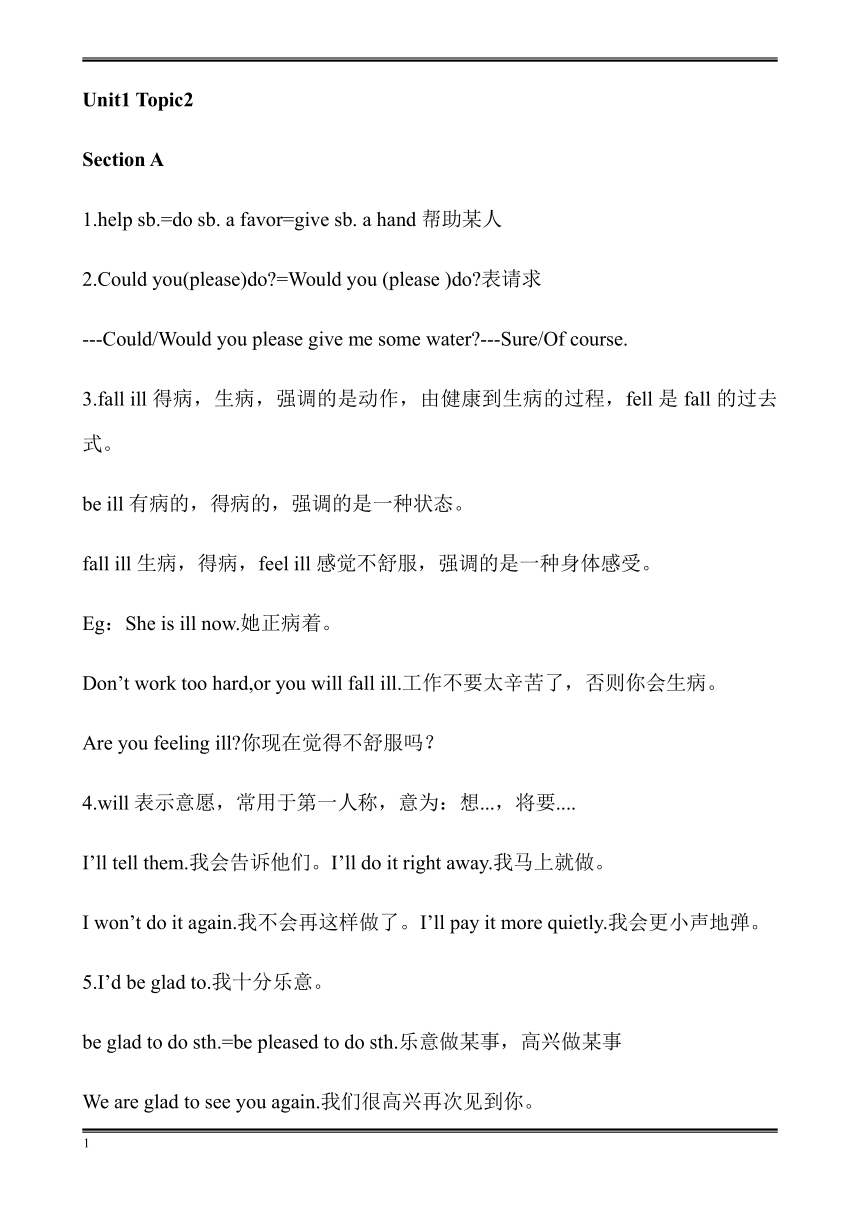
1038860010160000Unit1 Topic2 Section A 1.help sb.=do sb. a favor=give sb. a hand帮助某人 2.Could you(please)do?=Would you (please )do?表请求 --Could/Would you please give me some water?--Sure/Of course. 3.fall ill得病,生病,强调的是动作,由健康到生病的过程,fell是fall的过去式。 be ill有病的,得病的,强调的是一种状态。 fall ill生病,得病,feel ill感觉不舒服,强调的是一种身体感受。 Eg:She is ill now.她正病着。 Don’t work too hard,or you will fall ill.工作不要太辛苦了,否则你会生病。 Are you feeling ill?你现在觉得不舒服吗? 4.will表示意愿,常用于第一人称,意为:想...,将要.... I’ll tell them.我会告诉他们。I’ll do it right away.我马上就做。 I won’t do it again.我不会再这样做了。I’ll pay it more quietly.我会更小声地弹。 5.I’d be glad to.我十分乐意。 be glad to do sth.=be pleased to do sth.乐意做某事,高兴做某事 We are glad to see you again.我们很高兴再次见到你。 6.Would/Do you mind+doing sth.?你介意做某事吗?/如果...可以吗?/请你...好不好?常用来表示委婉的请求,或用来表示希望得到对方的许可。 回答时如果表示“可以”,要说Not at all./Of course not./Certainly not./No problem.当然不介意。如果表示“介意,反对”,则常说Sorry./I’m sorry about that./I’m afraid you can’t./Yes./You'd better not. Eg:-Would you mind giving me some water?-Not at all./Of course not.不介意。 Would you mind+if引导的从句=Do you mind+if引导的从句:如果....,你介意吗?do不如would客气。 Eg:Do/Would you mind if I sit here?如果我坐在这,你介意吗? mind+名词/代词+动名词 Would you mind my smoking?你介意我抽烟吗? 否定形式:mind not+doing sth. -Would you mind not throwing bottles around?你不要乱扔瓶子好吗? -I’m sorry about that.I won’t do it again. throw around四处乱扔 7.practice(动词)练习practice sth.练习某物practice doing sth.练习做某事 (名词)Practice makes perfect.孰能生巧。 8.kick(动词)踢kick sth. to sb.=kick sb. sth.把某物踢给某人 pass(动词)传递pass sth. to sb.=pass sb. sth.把某物传给某人 经过,通过。I pass a beautiful garden everyday on my way home.每天我回家的路上都会经过一个漂亮的花园。 (考试,测试)及格,合格。With the teachers’ help,I passed the exam at last. 在老师们的帮助下,我最终考试及格了。 9.在英语中,有些动词可以跟两个宾语,一个叫间接宾语,一个叫直接宾语。常见的能跟双宾语的动词有:bring,throw,buy,lend,find,make,pass,teach,tell,write等。 结构:主语+及物动词+间接宾语+直接宾语 (1)直接宾语表示动作作用的对象,通常指的是物;间接宾语表示动作所指向的人,一般人在前,物在后。 Eg:He gave me a ticket.他给了我一张票。 My mother bought me a computer. 我的妈妈给我买了一台电脑。 (2)如果物在前,人在后,则由介词to, for等引出,成为介词间接宾语。 Eg:He gave a ticket to me. 他给了我一张票。 My mother bought a computer for me. 我的妈妈给我买了一台电脑。 (3)如果直接宾语和间接宾语同时使用代词时,需由介词引出间接宾语。 Eg:He gave me it.(误)He gave it to me.(正) 10.keep (sb. )doing sth(使某人)继续做某事Keep trying.继续努力。 keep doing sth.强调状态的继续,常与延续性动词或表示静止状态的动词连用,表示不间断地持续做某事。(一直做某事) Eg:He kept talking for about ... ...
~~ 您好,已阅读到文档的结尾了 ~~

